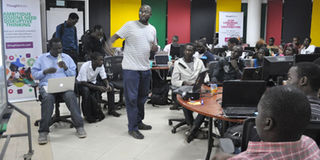Prime
App developers eye SMEs with smart solutions

One of the Information Technology developers shows potential clients how to create programmes on the Internet . photo BY RACHEL MABALA
On the sixth floor of Soliz House along Lumumba Avenue quietly stands a software development firm, ThoughtWorks, which is helping companies achieve bigger ambitions through technology.
Not until I was invited for one of their enterprising initiatives, dubbed Geek Night, a day on which software enthusiasts, developers and innovators meet to socialise on matters of technology; I had not heard about the firm.
But a quick browse of ThoughtWorks on the Internet returns positive results. The firm with global footprint opened its second office in Africa in Kampala in August 2012 and currently employs 38 Information Technology (IT) specialists, majority of them being local innovators. The other office on the continent is in Johannesburg.
The surge in demand for IT ingenuity is what the firm wants to tap into by helping clients get powerful ideas to the market fast.
“We discover and deliver disruptive new offerings and integrate new digital experiences with core systems,” says Stephen Magero, the company’s project manager.
The first office was set up 20 years ago in the US, Chicago with the aim of attracting knowledge in the world and building a community based on attitude and aptitude, but in Uganda, ThoughtWorks is gaining ground for knowledge transfer by tapping innovations and currently operates in 19 countries across the globe.
The firm deals in building and upgrading web-based applications for financial systems like banks, software sustainability for business and innovations.
Mr Magero says they help clients improve and deliver through technology.
“You name it and we shall do it,” he noted in an interview with Prosper magazine. “Our focus is to build programmes that will have an impact either on business or society and this we do through sharing knowledge and best practices.”
The firm employs two Kenyans, two Nigerians, one Madagascan, one South Sudanese, one Chinese, a few Indians and one or two Europeans, which it says helps for knowledge transfer.
“Most of what we do was being done by expatriates when we had just started but things have changed. We have brought on board so many local innovators and in a short time to come, we shall be transferring them (locals) to other countries to share, test and explore their knowledge.”
ThoughtWorks is also helping Information Technology, Computer Science and Software Engineering students from local tertiary institutions such as Makerere and Kyambogo universities in several programmes.
“After establishing our first office in South Africa in 2012, we thought of opening up another one in Nairobi but then we decided to test Uganda,” he adds.
“What is fascinating is that Ugandans are investing immense resources; both time and money in ICT, which brings about some sort of vibrancy and zeal in the growing software industry. So many students are innovating and we may not necessarily help all of them but we extend our assistance in several ways.”
One of the ways is through Geek Night, which brings together software enthusiasts, they embark on learning and problem solving in the field.
Plans
Looking forward, the firm plans to widen its footprint in the next five years and up its relevance in the software industry in addition to growing its client base to sustain the business.
Uganda’s situation (in terms of software development/advancement) is neither the best nor the worst but Mr Magero says often times, they find problems securing work permits for the foreign experts they want to hire from other countries to contribute to the current knowledge base.
“Sometimes you want to hire an expert on something from wherever in the world but because his expertise is either scientific or uncommon, trouble comes in at the immigrations having a permit secured.”
For now, the firm is working to consolidate its business because the software industry in Uganda is ripe.




